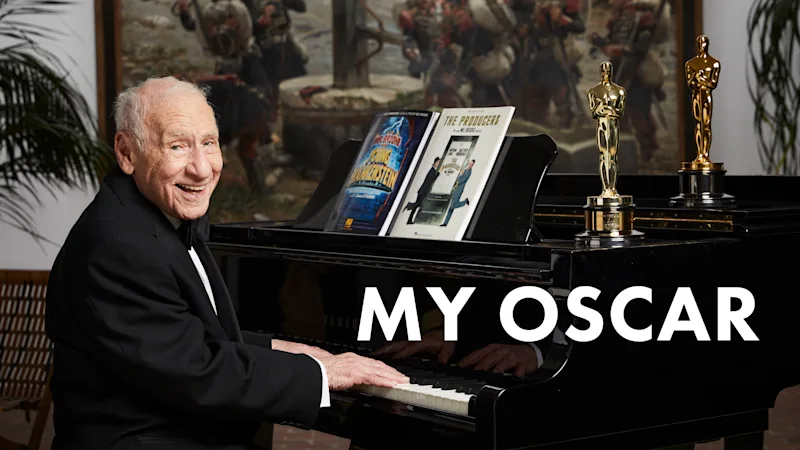
When he was growing up in Dublin, Benjamin Cleary’s parents let him draw on his bedroom walls. “I remember I used to design video games on my bedroom wall and think of my own version of Disney type stuff,” he recalls. It was the start of Benjamin’s journey as a storyteller, one that led him to a master’s in screenwriting, to the Oscars, where he received the 2016 award for Best Live Action Short Film for Stutterer, and to his first feature, Swan Song, which debuts on Apple TV+ on Dec. 17.
Swan Song follows Cameron Tucker (played by Mahershala Ali) as he grapples with the prospect of cloning himself so his family won’t have to grieve his imminent death. The film also stars Naomie Harris, Glenn Close and Awkwafina in roles that ground a somewhat distant future in emotions we can all recognize.
The movie’s themes of love and loss stem from real experiences in Benjamin’s own life. “I experienced the loss of three friends of mine when I was 19, 20, 21—three summers in a row—and that had a huge effect on me,” he says. “I started to constantly worry and catastrophize about what would happen if something happened to someone I loved, or what would happen to my family if something happened to me. It became an intrusive thought.” He never sought therapy (“No one did therapy back then in Ireland”), but working on Swan Song proved to have its own cathartic effect.
On his path as a screenwriter, Benjamin kept hearing, “Write what you know.” And while he took that literally at the beginning, he’s since tacked on his own addendum to that piece of advice, which is to write what you know, but through a different lens, or through metaphor. “I discovered that, through a story, I could actually talk about very personal things without having to ever really talk about myself,” he says. The imagined premise of Swan Song bubbled up from his subconscious, and he was quickly able to identify the real emotions it was bringing forth, ones that he had “buried away and hadn’t really dealt with.” The past five years, then, have become both a process of making a movie and “a long-overdue form of self-therapy.”
Through Cameron’s character, Benjamin was able to “explore the full breadth of a life and have a meditation on memory and the fleeting beauty of our time here,” while also weaving in a love story at the heart of the film. But having two-time Oscar winner Mahershala Ali lead the project was never in Benjamin’s original plan. “I didn’t think we could even get someone of Mahershala’s caliber to even read the script, but we did, and I heard that he loved it, which was a total pinch-yourself moment.”
Benjamin reread the script the night before meeting Mahershala. When he pictured Mahershala in this role, as the voice of Cameron (and his new doppelgänger), “the script was completely alive again. I was reading through it, and I was weeping, and I was just feeling it so deeply. It was like a magical experience of suddenly getting total objectivity back.”
Oscar nominee Naomie Harris joined soon after as Cameron’s wife, Poppy. The two actors had previously collaborated on Moonlight, but Swan Song revealed a new kind of chemistry between them. In the film’s meet-cute, Cameron and Poppy find themselves sitting across from one another on a train. It’s a scene that Benjamin had played in his head for years, and yet, when Mahershala and Naomie brought it to life, “it was just magic.” Amid a chaotic, difficult, COVID-19-conscious shoot, “you see these two people, totally on top of their game, creating something that, for me, was beautiful.”
There were other moments when Benjamin found himself drying his eyes from behind the camera after calling cut. “I’d look around and see a whole room full of the crew just deeply moved,” he says. Everyone in the cast and crew had forged their own connection to the story, building a level of trust that, to Benjamin, made for a “beautiful set.”

With how familiar the characters and their dilemmas feel, it’s easy to forget that Swan Song is essentially a sci-fi film. That was intentional on Benjamin’s part. “I really wanted to ensure that we built a world that felt very relatable and never took us out of it or felt like we were so far in the future that we didn’t recognize it,” he says. He credits many of the aesthetic choices to a strong collaboration with production designer Annie Beauchamp, from the vehicles to the contact lenses. “She completely got the vision, and we ended up finding great things together. My team probably got a bit sick of hearing me saying, ‘Too sci-fi, too sci-fi,’ all the time, but it was just a way of [making everything] feel organic.”
While editing his 2015 short film Stutterer, which he self-financed while working at a burger joint, Benjamin never imagined what it could have led to next. Making Swan Song, he says, has been a “full five-year-long education.” If he’s learned anything, it’s to muster the confidence to attempt a project this ambitious in the first place—and then all the lessons that come with helming a big movie with big names. “Directing is this crazy job … You’ve got to be a friend one minute, you’ve got to be a technician the next minute. There are different questions coming at you and you’ve got to wear all these different caps. But I suppose the only way of learning that is to do it: Jump into the deep end and see if you can try and swim. It’s difficult, it’s challenging, but it’s incredibly rewarding, and you take all that and you go on to your next one hopefully knowing more and feeling a little more confident.”




